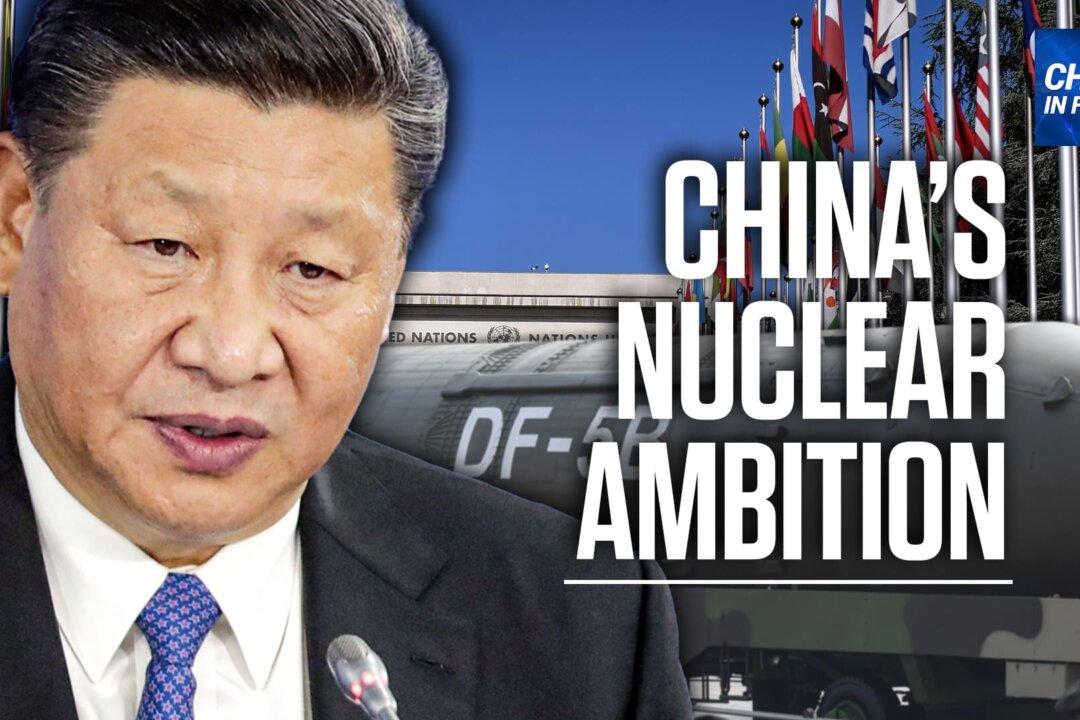Meier interviewed Patty-Jane Geller, policy analyst of nuclear deterrents and missile defense at the Heritage Foundation, and Rick Fisher, senior fellow at the International Assessment and Strategy Center, in this episode titled, “‘CCP Wants to be the Most Powerful Force on Earth’: Rick Fisher on China’s Nuclear Ambition.”
Meier started the interview by asking why there seems to be a policy shift among countries that are no longer paying attention to America’s nuclear deterrent strategy.
According to Fisher, some would say China is rapidly building up its nuclear arsenal in order to protect itself and compete with the United States, but that is false. He said China has been building up its nuclear capabilities for decades, jumping from about 300 to 400 warheads to a level approaching 3,500 warheads. He explained that the Chinese Communist Party (CCP) wants global nuclear superiority in order to become the greatest political, economic, and military power on Earth.
Geller said China has now expanded its arsenal beyond the minimal deterrence and has become a peer nuclear competitor to the United States.
When asked about de-escalation methods, Geller said brute force and strong defense are both important, but a strong defense is very critical because it enables the process of diplomacy. America wants to have strong forces so that it can solve crises with diplomacy and try to get China to negotiate and find an agreement that can improve stability.
Fisher said the most common approach is to sit down and talk about de-escalation, which is what the Soviet Union did after 15 years of nuclear competition with the United States. Eventually, both sides started a negotiation process that led to successive nuclear reduction agreements, but this came after the Soviet Union realized that building thousands of nuclear weapons wasn’t advancing its interests in seeking more security, or allowing it to gain the power it was hoping for.
Before the Soviet Union collapsed, it had a negotiation process with the United States that provided stability and was welcomed around the world, except in China—because the CCP, in Fisher’s opinion, has never given up its goal of total world domination. According to Fisher, the Chinese don’t want to engage in nuclear reduction talks until they are superior, at which point they will not engage in limitation negotiations, but rather will issue orders, telling the other nuclear powers what they can have. This would allow the CCP to retain power over other countries, and to monitor what others say, think, and do. In order to accomplish this, China is now working rapidly to build up its nuclear arsenal.
Geller said it is difficult to get Beijing to negotiate, but she believes it’s worth the effort. China is reluctant to be part of negotiations, claiming that it doesn’t have as many nuclear weapons as Russia and the United States. While nuclear powers engage in talks, China continues to builds up its stockpile. The lack of transparency over its arsenal and intentions will make it difficult to compel Beijing to come to the table.
Fisher said that in order to get the CCP’s attention, America has to have the ability to threaten everything that they value. He explained that it doesn’t mean Washington will use that power, but it is important to have it, citing that this is what the United States did with the Soviet Union. America will have to keep building up to high numbers until the Chinese realize their only good option is to build down. The issue here is that China will link any nuclear reduction to political goals such as demanding the United States to stop supporting Taiwan, or to destroy certain military alliances that preserve freedom in Japan, Fisher said.
In other words, China will force America to essentially “go home,” using its nuclear power to accomplish military defeats on the democracies and make them weaker so they succumb to CCP hegemony. “You can’t talk them out of it,” said Fisher. “All you can do is build to numbers sufficient which will add up hopefully to demonstrating to the CCP leadership that such a sprint to nuclear superiority is futile.”
Meier asked how Russia would respond if the United States were to break the New Start Treaty, which limits each country to around 1,500 warheads. Fisher said that the Russians are already exceeding their limits and producing new weapons. The real question is: when will the United States start doing the same thing? In order for the United States to build up its arsenal sufficiently, it would need to get out of the treaty. But this may not happen because Washington and Moscow extended the treaty for another five years, which Fisher believes contributed to Beijing’s decision to build up China’s nuclear silos.
Geller said that experts and lawmakers in the United States are debating on whether or not to replace the country’s aging nuclear weapons that were built during the Cold War. At present, the U.S. arsenal is most likely strong enough to deter a nuclear threat, but the systems need replacement and the intercontinental ballistic missiles (ICBMs) are set to start retiring at the end of the decade.
When Meier asked how close China is now to competing with the United States, Fisher said very close. He said China has been very strategic in the way it has developed and hidden their capabilities as well as their intention. “We have now reached a period where it is almost too late,” adding that the United States has yet to wake up to the full extent of the CCP’s ambitions. Fisher believes the Biden administration is not doing a good job in informing the American people, and that America needs to invest in missile defense and civil defense in the event China and Russia decide to strike the United States. Calling this a very dangerous period, Fisher said the world leaders need to pay attention to this threat and to act now.
Currently, the United States has about 44 interceptors that can be launched in the event of a warning of an incoming nuclear missile, intercepting it before detonation, but those are only designed to intercept small or limited threats—they are not meant to defend against China’s current nuclear forces. Geller emphasized the need for the United States to develop advanced missile defenses in specific regions, so that if China tries to start a conflict, America would have the defenses to stop it.
According to Fisher, the current number of U.S. missile defenses is designed to cancel a nuclear threat from North Korea, not defend against China or Russia. The United States would need enough offenses to show the CCP that everything they value will be destroyed if they engage in nuclear war. Although it would be very expensive, America needs to invest heavily in missile defenses and to build up nuclear arms in order to rise to the level needed. This process has to continue until China decides to give up its ambition of ruling the world.
Fisher also said that India should build up its nuclear capabilities and that U.S. allies should decide if they need a nuclear deterrent as well, and hopefully Washington would support that decision. “China has made Pakistan, North Korea and Iran into nuclear missile states which is a travesty. We haven’t even sanctioned China for all of its aid to North Korea’s nuclear missile capabilities. It’s a demonstration of weakness.”
Meier asked how the average American can learn more about the nuclear issue. Fisher said the Americans should know that the CCP has already massacred 7 million of their own people. “They don’t have more regard for the rest of us. If China achieves global hegemony, we already have the answers of what to expect. Death and more death.”
Geller said the United States can see China building nuclear capabilities that nobody saw coming. In her opinion, this tells us we don’t know what else China is doing and that it has the capacity to make quick changes to its arsenal. She hopes that mainstream media will pay more attention to the issue so that it would push U.S. lawmakers to focus on building up America’s military defenses.
Fisher calls on the American people to take action. Every year the Pentagon publishes a report mandated by Congress on China’s military capabilities. He said these reports are accessible and Americans should read them to get a sense of the history of this topic and decide if their leaders are effectively defending their country.
“Our process depends on citizens making themselves informed, seeking information and making decisions. If you decide not to do that, if you decide not to care, then you are giving the advantage to the Chinese Communist Party,” Fisher said.
Follow EpochTV on social media:





